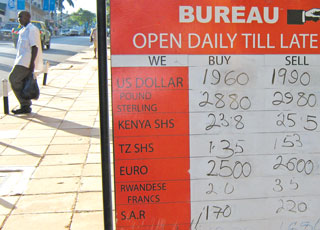
By Patrick Kagenda
Basing on reduced US dollar remittances into the economy last December, Forex market operators are warning of a further battering of the shilling.
Experts fear the dollar scarcity that led its value to shot up by 30% from Shs 1,700 to the dollar to Shs 2,200 before settling in the upper Shs 1,900s by years-end could persist into early 2009.
Mr. Hashim Kirungi of Bank of Uganda’s Media Relations Desk said month””on-month, for example, the shilling depreciated by 16.9% against the US dollar from July 2008 to November 2008. He attributed it to the increased demand for foreign currency from both corporate and offshore players and the dollar’s gaining strength against other major international currencies in the market.
Normally, remittances peak during the festive seasons and during opening of school terms mainly in December. But last December, the MD of Klyn Cash Forex Bureau, Ali Tijadi, said Ugandans living abroad have reduced on the amount of money they were sending due to the economic crunch.
Remittances usually come from United Kingdom, USA, Japan, South Africa, and Sweden where Ugandans are employed in different jobs.
However, big employers there continue to slash jobs as consumer spending declines.
All these layoffs have an impact on remittances to Uganda as some Ugandans are employed in those institutions.
Luigi Cordeiro D`souza, the Head of Treasury at Crane Bank and chairman of the Dealers Association of Uganda said the global crunch has led to more dollars going out.
At the time, experts in the forex market told The Independent that up to US$1.5 million (Shs 2.9 billion) was being sucked out of the Ugandan money market on a daily basis.
“We rely on remittances but because of the volatility in the currency markets there is a scarcity of dollars on the local market,” said D`souza., Remittances represent direct dollar inflows into the economy, different from Foreign Direct Investment.
Generally called kyeyo or money from Ugandans working abroad, remittances rose by a mere 10% from US$ 430 in 2006/7 to US$ 439 in 2007/8. Remittances are central to the economy having surpassed coffee, which only fetched US$348 last year, as a foreign exchange earner., Although individuals holding dollars are happier because they can get more shillings, the worrying short-term effect of a weakening shilling against the US dollar could be a surge in inflation., Controlling inflation, which has for years been the fundamental economic policy of the government, appears to be floundering as it hit its highest rate ever in recent times of 15.7% in Q4 last year.
Although the annual inflation rate fell by 14.1 percent in December from 14.6 in November, the double digit figures were the highest in a decade. The annual headline inflation rate in December 2007 was 4.9% having declined from 5.2% in November, according to Bank of Uganda statistics.
The level of prices has been generally going up on the back of rising fuel and food prices. According to some reports, some commodities have gone up by more than 100 %. A report by a Chinese news agency, said the price of tangerine rose by 128 %, salt 70 %, millet flour 56 %, cooking oil 54 %, sweet potatoes 35 %, malwa 39 %, tomatoes 32 %, beans 30 %, meat and poultry 32 %.
As per the government free market economy policies, the Central Bank has consistently pumped dollars on to the market, in a bid to smoothen out any volatility, without interfering with the operations of the money markets. , A strong dollar is likely to spur inflation because it will make imports more expensive which in turn will result in high prices for such imported goods on the local market.
The long-term effect of a weakened shilling, according to experts will depend on how effectively the shilling can rally against the dollar in the face of the global financial turmoil that was first announced in September 2008 as an American problem but appears set to run deep into 2009 after spreading into a western world issue and eventually becoming a global crisis. Uganda Central Bank Governor Emmanuel Tumusime Mutebile has said the effect of the global financial turmoil on Uganda’s economy would be minimal. He based his positive prognosis on the economy’s fundamentals, which he described as “strong”. However, experts wary of a depreciating shilling also point at fuel scarcity, spiralling prices, soaring inflation rates, and an irrational indifference that has depleted 60% of the stock value on the Uganda Securities Exchange All Share Index.
Most foreign exchange dealers whom The Independent spoke to said the shilling could continue to lose value against the dollar in the New Year due to other factors like the fall in oil prices and over-dependency on foreign aid. Exporters, who should be happy because a weak shilling makes exports more attractive, are affected according to Crane Bank’s Foreign Exchange Dealer, Ali Abbas. “Uganda’s fish and other exports have been going down and this is fetching less money from the sales of such products in outside markets.”
Mutebile has said his projected GDP growth of 5% for 2009 was off the mark by 2 percentage points after the IMF projected 7% in these hard times. These projections, however, are likely to be off the mark if the shilling’s value takes a dive and inflation spirals out of control.
 The Independent Uganda: You get the Truth we Pay the Price
The Independent Uganda: You get the Truth we Pay the Price


